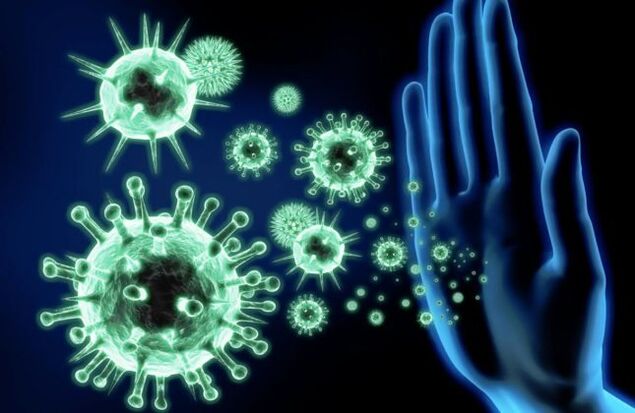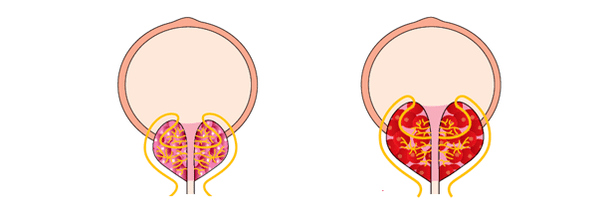Inflammation of the prostate tissue is very common, and the cause of male prostatitis is infection and congestion. According to statistics, 30% of men have already suffered from this disease 30 years later, and with age, this number is getting bigger and younger and younger. As you know, the best treatment is prevention. If we know the cause of a specific pathology, then it will be easier for us to protect ourselves from it.
Where does prostatitis come from?
The clinical manifestations of the disease can include a different set of symptoms. The most common and most important are urinary system diseases and sexual dysfunction. In each case, a set of symptoms and their degree of manifestation depend on a person’s individual characteristics, especially his lifestyle, general health, and the work of the immune system.

According to the reason, it is customary to distinguish between two forms of disease:
- Infectious
- Stagnant.
Causes of infectious prostatitis
Among the infectious forms of the disease, the cause of prostatitis is pathogenic microorganisms. In this case, the disease develops when an infection foci is formed in the prostate. It can occur in both acute and chronic forms, but infectious prostatitis is more common in acute. At the same time, the overall health of the man deteriorated, with pain in the waist and groin, the urination process was disturbed, and the body temperature increased.
Acute prostatitis
The direct cause of male prostatitis is the foci of infection, which can be located in completely different organs. Pathogens enter the prostate ascending from the rectum or urethra or descending through the blood and lymph.
The most common pathogens of acute prostatitis:
- Escherichia coli,
- Staphylococcus aureus,
- Streptococcus,
- Neisseria gonorrhoeae.
What causes prostatitis, and where are the infection foci that cause acute inflammation of the prostate? First of all, urinary system infections, sexually transmitted diseases, upper respiratory diseases, and intestinal infections can all cause prostatitis. Even ordinary dental caries can cause the development of prostatitis, because dental caries can be infected.
The ascending path of the spread of pathogenic microorganisms is that they enter the prostate tissue from the rectum and urethra. When does this happen? In most cases, this phenomenon is caused by urinary system infections: cystitis, urethritis, pyelonephritis. One possible cause of prostatitis is sexually transmitted diseases, of which gonorrhea is the most common. If a person suffers from this disease, then a foci of infection will form in his body, which is located near the prostate. This means that the pathogenic microbiota can easily spread to the prostate tissue. If your partner is sick, unprotected sex may cause Neisseria gonorrhoeae or trichomoniasis to enter the prostate.
The descending route of infection transmission means that it penetrates the blood or lymph from the organs located above the prostate. In this case, the cause of prostatitis is the negative impact of infection of the throat, upper respiratory tract or oral cavity on the body. Among the diseases that cause prostatitis, there may be bronchitis, flu, tonsillitis, and tuberculosis. Inflammation of the prostate caused by these problems is usually a complication, with the first symptoms appearing a few weeks after the underlying infection.

Immune status plays an important role in whether inflammation occurs. Not all men with infected lesions will develop prostatitis. If the body is in an active state, the immune system will respond to the infection and the pathological process will stop. The deterioration of the defense state leads to the development of complications. They are manifested in various diseases, which depends entirely on personal characteristics and physical "weaknesses". The prostate is one of the most sensitive organs in the male body, so any negative effects will affect its condition.
Why does immunity decrease? The reasons for this are stress, malnutrition, sedentary lifestyle, and hypothermia. The infection itself, especially sexually transmitted infections, can become a factor in reducing immunity and lead to complications.
Chronic prostatitis
In the acute form of the disease, all symptoms are very obvious and it is impossible to not pay attention to them. Therefore, men with acute prostatitis should usually seek medical attention immediately. The chronic form of the disease is characterized by slowness, symptoms are not very obvious, health is usually maintained in good condition, and body temperature is normal. It is because of the low-symptomatic nature of chronic prostatitis that it has become so common. Men are not inclined to actively treat problems without obvious characteristic symptoms, so they usually do not rush to see a doctor, and have mild prostatitis.
How does chronic prostatitis cause? The cause may be the same as acute prostatitis, but due to the work of the immune system or the weakness of the pathogenic flora, the disease does not become acute, but develops slowly. However, the most common cause of chronic prostatitis is the acute form of the disease, which has not yet been sufficiently effectively treated.
Reasons for the transition from acute prostatitis to chronic prostatitis:
- Treatment started late,
- Wrong start of treatment
- Lack of treatment
- Immunity is significantly reduced.
In chronic prostatitis, the inflammatory process of the prostate tissue is not manifested, so the symptoms may not be felt until they worsen.

Chronic prostatitis is also characterized by the primary inflammation of the prostate will cause deterioration of the innervation of the organs, which will negatively affect its work and may lead to autoimmune processes. During these processes, the immune system produces antibodies against prostate tissue. This prostatitis will continue to develop even after the infection is cleared.
Causes of non-infectious prostatitis
Non-infectious, ie, congestive prostatitis, occurs due to congestion in the pelvic region. In most cases, it is chronic and gradually develops over time and symptoms increase. This form of prostate inflammation occurs most often.
What causes male prostatitis in most cases? The main reason is that the blood circulation is blocked and it is stagnant. As a result, the organs cannot get enough nutrients and oxygen, and the secretions are not completely discharged, that is, favorable conditions for the development of inflammation appear. This condition usually occurs in men who are less active, and less frequently in traumatic settings.
Causes of stagnant prostatitis
- Lack of physical activity
- Work related to sitting at the table and driving for a long time,
- Irregular sex life
- constipate
- Excess weight,
- Unbalanced diet
- Often suppress the urge to urinate
- Smoking and alcohol
- Waist injury
- The structural characteristics of the organs of the genitourinary system.

All these reasons will adversely affect the local and systemic blood circulation. For example, smoking and frequent alcohol consumption can greatly weaken the tone of blood vessels, thereby impairing blood flow throughout the body. The prostate is also affected by this. Pelvic organ stagnation affects sedentary men, as well as those who spend a lot of time driving or are used to passively lying on the sofa. Sedentary, generally speaking, is not good for men's health at all. In any case, the blood vessels supplying the pelvic area are squeezed, and the blood supply to the prostate is worse.
An unbalanced diet can worsen the general health of the body, overweight, and poor bowel function. All of these will also have an adverse effect on the state of blood circulation, especially in the organs of the genitourinary system.
Sexual life is very important to men's health and should be regular. Sex 3 times a week is the average, but everyone has their own characteristics, which depends on the man's physique, his desires and needs. Insufficient sexual activity can lead to stagnation, because the inevitably accumulated pressure will not be released. Not only will there be blood stagnation, there will also be secretions from the prostate, which accumulate harmful substances.
Excessive sexual activity is also harmful because it requires a lot of strength from men, causing physical and nerve exhaustion, and hormonal imbalance. All of these have become a factor that triggers inflammation of the glandular tissue.
A sedentary lifestyle is one of the most common causes of male prostatitis. Today, we often use transportation to move houses and take elevators upstairs. In order to make our lives easier, we have done a lot of work. However, the human body, especially men, is designed for high-intensity exercise. In order to get it, men should do some kind of exercise. You can always choose what you like and bring happiness. Daily gymnastics includes simple exercises and walking, and good results can be obtained.
Anatomical features of blood vessels or other structures located in the pelvic area can cause hyperemia of the prostate. These characteristics may be due to congenital abnormalities or defects, or they may be obtained from trauma or other diseases. The destruction of tissue structure, the state of blood vessels, the formation of cysts or tumors usually result in significant changes in the function of the organ itself and the arteries and veins that provide its blood supply.
When to worry
If a man feels he has problems urinating and starts to go to the toilet more frequently, he is worried about pain in the waist and groin, then you need to see a urologist. Even minor performance cannot be ignored. The appearance of these symptoms indicates that the body has undergone adverse changes.

If you experience urination problems, groin and waist pain, you should consult a urologist!
Diagnosis and treatment
The cause of prostatitis is closely related to treatment. Therefore, in order to successfully overcome the disease, a comprehensive diagnosis is necessary.
Diagnostic procedure
- Collect medical records,
- Digital rectal examination,
- Ultrasound,
- Bacteriological analysis of prostate secretions,
- Blood and urine tests,
- Analysis to determine the PSA level.
These procedures can understand the condition of the prostate, so that inflammation and its causes can be determined. PSA levels are required to rule out adenomas and prostate cancer. This analysis needs to be repeated to monitor the success of the treatment.
The need for comprehensive treatment of prostatitis, including the following methods:
- medical treatement,
- massage,
- physiotherapy,
- physiotherapy.
According to the cause of the disease, drugs are prescribed to eliminate infectious components, improve blood circulation, urine and glandular secretions, and relieve spasms. The sooner treatment starts and the more responsible a person is to him, the better his results will be.
However, the best way is to prevent the disease, and then you don't have to treat it. Prevention for men is to avoid causes and predisposing factors, live a healthy lifestyle, and remain sexually active.
























